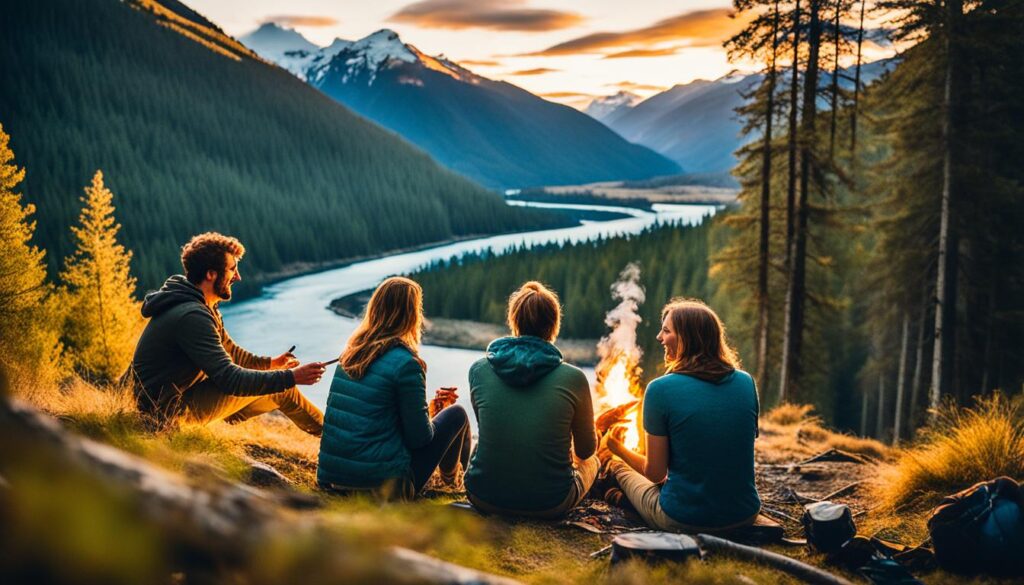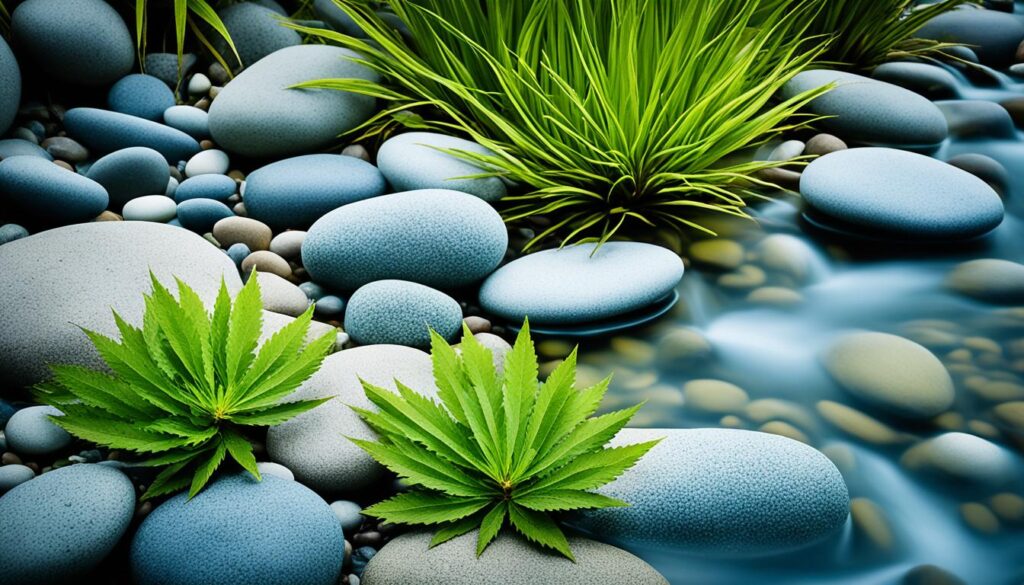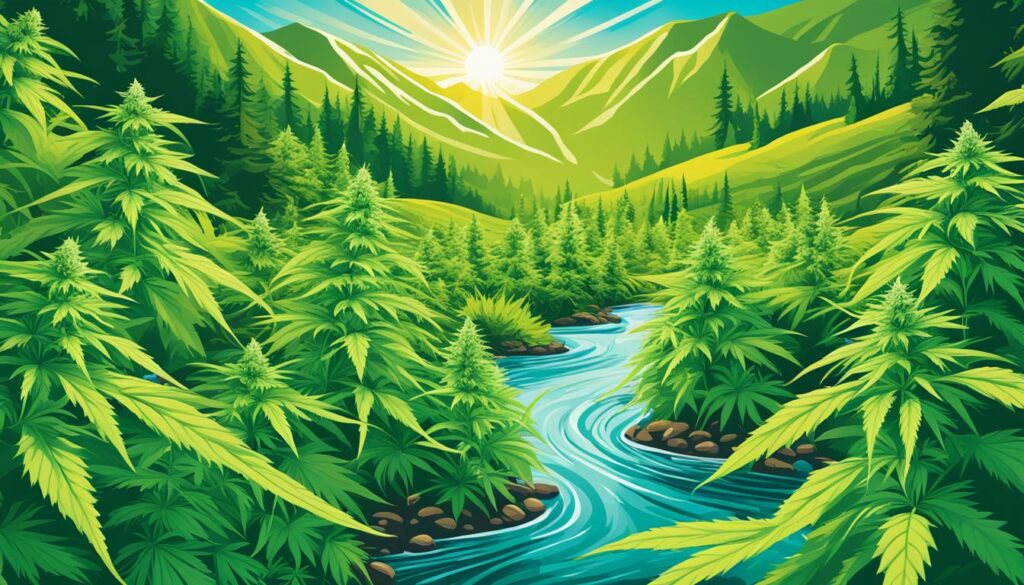Welcome to the South Island of New Zealand. Here, beautiful landscapes and scenic views hide a complex story with cannabis. We’ll look into the legal status, local views, and risks of using this substance.
The South Island is perfect for those who love the outdoors and nature. But, it also has a strong cannabis culture. If you’re here, knowing about the local weed scene is important.
This guide will cover the history of cannabis in New Zealand. We’ll talk about how often people use it, medical marijuana, and efforts to change the laws. We’ll also look at the differences between weeds and cannabis, and their effect on the environment. By the end, you’ll know a lot about weed in the South Island.
Key Takeaways
- The South Island of New Zealand has a thriving cannabis culture, with a complex legal and regulatory landscape.
- Recreational use of cannabis is widespread, despite the drug’s official prohibition.
- Medical marijuana is available, but access is limited and tightly controlled.
- Ongoing efforts to reform cannabis laws in New Zealand have gained momentum, but progress has been slow.
- Understanding the differences between weeds and cannabis is crucial for navigating the region’s unique weed scene.
Introduction to Weeds in New Zealand
New Zealand has many plants, but it also has a big weed problem. Over 2,000 types of weeds are found here. These weeds harm the native plants and the balance of nature.
They stop native plants from growing and can even stop new plants from starting. This can change the whole ecosystem.
Types of Weeds Found in New Zealand
In New Zealand, you can find many kinds of weeds. They range from tall trees to vines. Some weeds like Gorse, Scotch Broom, and Common Heather were brought here for beauty but now they’re everywhere.
They take over fields and natural areas. This is a big problem.
- Crocosmia x crocosmiiflora, once a pretty plant, is now a bit of a nuisance in New Zealand, the UK, and the US.
- Gorse was meant to be a hedge but now it’s taking over fields in New Zealand.
- Scotch Broom has spread in North America, New Zealand, Australia, and India.
- Common Heather is now a big plant in Tongariro National Park, New Zealand.
Impact of Weeds on the Environment
Weeds in New Zealand can cause big problems. They take over and stop native plants from growing. This changes the balance of nature.
This can affect many animals and plants. It can even harm the whole ecosystem.
“Weeds can have a significant impact on the environment, causing ecosystem disruption and threatening the survival of native plant species.”
Fighting weeds in New Zealand is a big task. But if we stay alert and understand the issue, we can beat it. By knowing which weeds we have, we can protect New Zealand’s beauty and nature.
Weed Identification Guides for South Island
Managing weeds in South Island, New Zealand, starts with knowing what they are. Luckily, there are two great tools to help. The Weedbusters website and the Landcare Research identification key are perfect for learning about different weeds.
Weed List – Weedbusters Website
The Weedbusters website lists over 100 weeds in New Zealand. It’s easy to use and gives lots of info on each weed. You’ll find the common and scientific names, and how it looks. This makes it easy to spot weeds in your garden or land.
Weed Identification Key – Landcare Research
For a bigger list, check out the Landcare Research website. It has an identification key for over 650 weeds. This tool asks you questions about the plant’s look. It helps you figure out what weed you have and how to deal with it.
Using these online tools makes you a pro at weed identification. You can then control weeds better in your South Island area. The Weedbusters and Landcare Research tools are great for Weedbusters and Landcare Research experts, and for anyone wanting a weed-free garden.
Cannabis (Weed) in South Island, New Zealand
South Island, New Zealand, has a long history with cannabis, also known as “weed.” It was once used as a medicine but now has strict laws. This shows how our views on this plant have changed.
History of Cannabis in New Zealand
In the 19th century, cannabis came to New Zealand for medical use. Doctors used it to help with pain and stomach problems. But, as people worried more about its dangers, laws changed.
Legal Status and Regulations
In 1975, the Misuse of Drugs Act made having or growing cannabis illegal. This law is still there, but some want to change it. In 2018, the government made medical cannabis legal for some patients.
Even with the law, cannabis is still big in South Island. There are both legal and illegal ways to get it. The area is famous for its top-quality weed, wanted by people all over the world.
The debate on making cannabis legal in New Zealand is ongoing. But, it’s clear that the story of cannabis in South Island is complex. It’s a topic that needs more looking into.
Recreational Use of Weed in South Island
Cannabis is a big deal in New Zealand, especially in the South Island. Studies show that by the time they are 21, most young people in Christchurch have tried it. About 5% of them have used it over 400 times. This shows how common cannabis use and recreational marijuana is in the area.
Using cannabis a lot can really affect your health. It can make you think slower, hurt your lungs, and even mess with your teeth. It can also make school harder and hurt your social life. Starting to use it young can also make you more likely to get mental health issues like psychosis or depression.
“Around 5-10% of the population is at heightened risk due to frequent cannabis use, dependence, or starting cannabis consumption in mid-adolescence and continuing into adulthood.”
About 80% of New Zealanders from the 1970s have tried cannabis. Most people don’t get hooked, but 4-10% of those who use it often might become dependent.

The issue of recreational marijuana in the South Island is complex. We need to understand it better. Research and smart policies are key to dealing with the health and social effects of cannabis use in the area.
Medical Marijuana in New Zealand
In New Zealand, medical cannabis is slowly becoming easier to get. This is even though the country still says no to recreational marijuana. The rules changed in 2018 to help more people get medical cannabis. This is mainly for people who are very sick and have less than a year to live.
Regulations and Access
Since April 1, 2020, New Zealand has had a Medicinal Cannabis Scheme. This scheme lets doctors prescribe medical cannabis products. But, you can’t bring these products from another country into New Zealand.
You can bring medicinal cannabis into the country if a doctor says you need it. You must have the right papers and not bring too much. The amount depends on what you need for a few months.
Medical cannabis in New Zealand costs between $2 and $10 a day. A big bottle of it can last 4 to 8 weeks and costs about $200. Both CBD oil and THC are legal if a doctor says you need them.
| Regulations and Access Points | Details |
|---|---|
| Prescription Requirements | Medicinal cannabis products are only available on prescription in New Zealand. |
| Personal Imports | Personal imports of medicinal cannabis products are prohibited by law. |
| Vaporizer Regulations | Vaporizers for administering medicinal cannabis can only be imported and sold in New Zealand if they are approved as medical devices by an overseas regulator. |
| International Travel | Travelers entering New Zealand can bring medicinal cannabis products if prescribed by a medical practitioner, along with specific documentation, in limited quantities. |
| Medicinal Cannabis Costs | Medicinal marijuana costs in New Zealand range from $2 to $10 per day, with a medium-sized bottle priced around $200 lasting between 4-8 weeks. |
The medical cannabis scene in New Zealand is growing. Patients and doctors need to keep up with new rules and ways to use it safely.
Weed in South Island, New Zealand
The beautiful South Island of New Zealand is home to both weeds and cannabis. The country is working hard to control invasive plants. At the same time, the use of cannabis for fun and health is a big topic.
Weeds, both native and not, are a big problem for South Island’s nature. Studies show over 38% of offshore islands and 14% of outlying islands have weeds. Birds, wind, and plants escaping gardens spread these weeds.
Since 2018, New Zealand has changed its rules on cannabis. Now, people can use cannabis for health reasons. Conditions like chronic pain and mental health issues can be treated with it. The Cannabis Clinic is a big help, offering this to patients all over the country.
| Medicinal Cannabis in New Zealand | Availability and Access |
|---|---|
| Conditions Treated | Chronic pain, mental health issues, sleep disorders, inflammatory and gastrointestinal conditions, neurological disorders, cancer-related symptoms, and treatment side effects. |
| Product Offerings | CBD oil, capsules, and flower |
| Prescription and Delivery | Patients can get prescriptions from the Cannabis Clinic. Then, they can get their medicine at local pharmacies or have it delivered. |
| Cost and Subsidies | Medicinal cannabis is not cheap. Patients pay for it themselves, based on what the doctor says they need. |
Using weed for fun is still a debated topic in New Zealand. But, the country’s program for medical cannabis is growing. It gives patients in South Island and elsewhere access to treatments with cannabinoids. Dealing with weeds and cannabis in South Island needs a careful and informed way.

Cultivation and Distribution of Cannabis
In New Zealand, growing and having cannabis for fun or health is mostly illegal. But, they let people grow industrial hemp under the Misuse of Drugs (Industrial Hemp) Regulations 2006. This looks at the laws on growing and sharing cannabis, and the role of industrial hemp in New Zealand.
Industrial Hemp in New Zealand
New Zealand made it legal to grow and share industrial hemp in 2006. This type of cannabis has little THC, the stuff that makes you high. This change has made it easier for people to grow cannabis and industrial hemp in the country.
Since 2006, it’s legal to grow and share industrial hemp in New Zealand. This lets people make hemp fibers, seeds, and oils for things like clothes, building stuff, and food.
But, growing and sharing cannabis for fun or health is still mostly illegal in New Zealand. If caught, you could get fined or even go to jail. The country is also fighting against drug trafficking by keeping an eye on these laws.
| Offense | Penalty |
|---|---|
| Possession of cannabis | Up to $500 fine |
| Cultivation of cannabis | Up to 7 years in jail or 2 years in jail and/or $2,000 fine, depending on the amount |
| Possession of cannabis by individuals under 17 | Possible arrest with various options for dealing with the offense |
| First-time cannabis offense for individuals 17 or older | Possible diversion |
The rules and laws on cannabis cultivation, cannabis distribution, industrial hemp, and drug trafficking in New Zealand are always changing. There are ongoing talks and efforts to change the country’s cannabis laws.
Cannabis Reform Efforts in New Zealand
Even though cannabis is illegal in New Zealand, people are working to change the laws. The Aotearoa Legalise Cannabis Party has been in many elections. They want to make cannabis legal. In 2020, people voted on it, but most said no.
There are many views on making cannabis legal. Some think it could bring in more money and help with medicine. Others worry about its effects on health and driving.
Since 2020, more people are getting cannabis for medicine in New Zealand. The government plans to use new tests for drugs in cars, like for drunk driving. This is to make roads safer.
The 2020 vote was close, but most people didn’t want cannabis to be legal. Yet, the push for political movements and drug policy reform is still going. The topic of cannabis legalization is still being talked about a lot.
“The tolerance level for THC in the new legislation is set at 1ng, while the high-risk level is set at 3ng.”
The debate on cannabis legalization in New Zealand is important. We need to think about the good and bad sides. Any changes should put people’s health, safety, and fairness first.
Weeds vs. Cannabis: Understanding the Differences
Many people use “weed” and “cannabis” the same way, but they are not the same. Weeds are unwanted plants that harm the environment. Cannabis is a special plant with its own laws.
Weeds have many types, each with its own look. Cannabis plants have unique leaves and flowers. Female weed plants have buds with THC and CBD. Male weed plants have flowers with pollen and seeds.
Weeds are often fought against, but cannabis has different laws. In New Zealand, cannabis laws are always changing.
“Alcohol and tobacco are consistently found to be more harmful than some illegal drugs, according to a note prepared by the Treasury supporting drug policy reform in New Zealand.”
Knowing the difference between weeds and cannabis helps with the environment and making laws. It helps people and lawmakers make better choices about these plants.
Ecological Impact of Illegal Cannabis Cultivation
Growing cannabis, for fun or health, can harm the environment, especially if it’s illegal. This illegal growing hurts the earth, destroys homes for animals, and messes with nature’s balance.
Risks and Challenges
Illegal growing uses bad pesticides and fertilizers. These can poison wildlife, harm their immune systems, mess with hormones, and more. They pollute soil, water, and food, making it hard for many animals to survive.
- Pesticides can kill many birds.
- They make it hard for some birds and big birds of prey to live.
- They can harm bird eggs, making it hard for them to reproduce.
- Pesticides also hurt fish, frogs, and lizards.
Also, illegal growing destroys nature spots to make way for cannabis farms. This breaks up homes for animals and messes up their paths to find food and shelter.
“Illegal cannabis cultivation poses serious risks and challenges to the environment, leading to environmental degradation, habitat destruction, and disruption of local ecosystems.”
We need to grow cannabis in a way that’s good for the planet. This means using farming methods that don’t harm the earth, following strict rules, and stopping illegal growing.
Conclusion
This article has shown us the complex world of weed and cannabis in South Island, New Zealand. We’ve seen the many types of weeds and how laws and use change. It’s given us a full view of the issues and chances in the area.
Studies show more people are using cannabis, especially older folks. But, not as many as in other countries. Still, growing cannabis illegally hurts the environment. We need to find a way to balance health, rights, and nature.
Think about what we’ve learned about weed in South Island, New Zealand and its laws. Let’s keep up with changes and work on lessening cannabis’s harm on nature. By doing this, we can help make a better future for people and the planet.

As a veteran weed smoker for over 30 years and been very clean for the last 3 years, I have been craving it.
One thing I’ve never done is consume it?
I came across SunJet Plug and thought mmmm how esp with legalities etc.
So I made the plunge and purchased 12 brownies, well within 30 mins it kicked in and it was immense as I had a whole one from the off 😜
The rest did not last a week I was having 2 a day and my wife lost me for a few days I was in my own world apparently.
Kudos to the Sunjet plug love em, the taste is a bit undesirable could do with a tweak or two other than that no complaints
Contact him on his telegram link: t.me/sunjetplug
His email : sunjetplug@gmail.com
Many many thanks.😁
Take note ,he does not have telegram channels
Sunjet plug is 100% legit.. I’m a repeat customer.. I’ve ordered 10+ times now, and I’ve never had an issue.. Great product, great service.
Sunjet plug is extremely trust worthy , they never fail in what ever product I order, and its always in my hands with an hour of ordering 99% of the time….. its honestly rare when its more than 2 hours and that’s only because its the weekend when ive orded or a national holiday is on or something lol …. brilliant service I’m probably pushing maybe 2 months with them and I’ve never been disappointed ❤️ my only recommendation would maybe do a stamp card to get something free after 5 orders or a loyalty bonus of some kind ❤️
Email sunjet.. sunjetplug@gmail.com